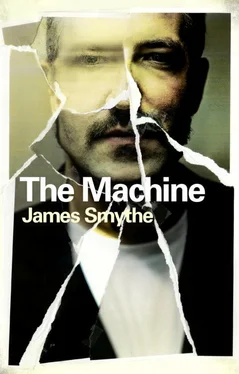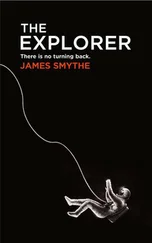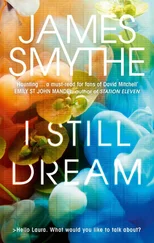Back in her flat she swallows the broad-bean-shaped tablet dry, and then she sits on the sofa with the fan pointed at her head. Sometime after that she falls asleep.
When she wakes up she’s moved herself again, to the spare bedroom. The Machine is still unplugged.
She can’t call in sick again the following day, she knows, not this close to the end of term; so she leaves the house after making sure it’s all unplugged. She shuts the spare bedroom door behind her – the Machine’s room, she thinks, as she does it – and checks the locks on her front door twice. She doesn’t know why. The Machine’s not going anywhere.
The heat hits her like a wall. Lots of the kids have already ducked out of school early. They’re on the cliffs, just down from the bit that’s become famous for suicides. Only a few a year, but that’s all that’s needed for fame. More than one and you’re suddenly notorious. It’s only twenty feet lower, but it ducks inwards at the base. No rocks to land on, just water. And this is the part of the island where the water’s at its bluest, and for a second, when you look at it, you can see what the island used to be: the sun glinting off the breaks, the cold blue that runs to you-don’t-know-how-deep. She recognizes some of the kids, but there’s no point in chastising them, because they’ll just jump and hit the water, knowing she will never follow them. They stand on the edge of the rocks, risking falling by just being there, given how chalky and loose the ground is, and then they wind up like toys, before springing off the edge, their limbs splayed, cycling and pounding the air as they fly. There’s a smack as they hit the water one by one, before dragging themselves out and starting the climb up the scree slope next to the point, then the climb up the chalky sides, a long steep path back to the top. And then the process begins again, repeated ad infinitum. Beth watches them for a few minutes. She wonders what happens to them after this.
At school, the kids who have turned up are restless. They know what’s coming. No chance of getting through to them in the final two days, if anybody ever tries. It’s easier to let them do their own thing. Takes the pressure off the teachers, takes the pressure off the kids to learn. Everybody accepts that these are days of failure. Still, Beth knows that she probably won’t be back here, even if the kids don’t yet. Her plan, when Vic is well again, is to go somewhere that’s used to the heat. To take advantage of the low prices, to buy up something on an island somewhere else, where they’re built for the heat. Teach in a school there. She’s thinking of a particular place – it’s the sort of dream people had when she was a kid herself, to pack up and move out to the tropics – but she doesn’t want to over-think it. She’s barely researched it, in case it’s tainted. Tempting fate and all that.
And now there’s extra reason: the Machine. She thinks about it in her flat, like some growth. Mould. Cancer. Waiting in the room, and somehow alluring, persuasive, even. She wants to get away from it suddenly, because it’s a reminder. There’s more to it, maybe. But she doesn’t want to think about it. Back of her mind, until she gets home.
Laura approaches her in the corridor. Feeling better? she asks.
Barely, Beth says.
Those last few days are a killer, aren’t they? You always feel as if your body’s giving up early. She turns and walks with Beth, not breaking step. Are you like me, always getting ill at the end of term? It’s like everything in me says, Oh, now you can be ill. She reaches out and holds Beth’s arm, like a doctor comforting a patient’s loved one. You can be ill on Saturday, she says. You have my permission. She laughs. I can’t, Beth thinks. Saturday’s when I need to be at my best.
They pass some year-ten boys fighting, and they get in between them, pulling them apart. Used to be that they couldn’t physically intervene, but here the rules are different. They have to be. One of the children is clutching a ruler, holding it flat against his palm, using it as some sort of blade. A hard edge on it. The other has thick welts on his back, and his shirt’s torn and pulled up over his hips. Beth frogmarches them both down to the Head’s office, where there are already children waiting, all in similar states of disrepair. She sits them down in front of the receptionist.
Don’t give her any shit, Beth says. They both smirk at her swearing. And don’t smirk at me. I’m sick of you both. Beth can’t remember either of their names, as she doesn’t teach them, but she’s sure that they’re regular troublemakers. She’s seen them before, always sitting here. Waiting.
By the time she gets back to her classroom there’s a note on her desk. It’s from Laura.
It’s going to be a busy couple of days, it reads. See you outside the gates tomorrow at three?
It’s an invitation, not a question. Beth breathes in. She looks at a picture of Vic that she keeps in the drawer of her desk. Two days left.
She doesn’t know what time it is, because the flat’s in complete darkness. Outside, on the walkway, she knows, a light comes on at ten and goes off at four. She looks around to see what room she’s in, but it takes her some time to adjust to the light. Total darkness, utterly pitch black. That’s enough: she fumbles for the spare-bedroom door, opening it and letting light in, the faded orange-grey light from the living-room window. She moves again and feels a sudden tug on her head: and on it, the Crown. She puts her hands up and feels the pads, each on a pressure point. Two on her temples. One on the top of her head, the lid. Two smaller pads at the back, towards the neck, hidden away.
No, she says. Her own voice sounds strange to her: distant and vague. She suddenly becomes aware of the hum, sly and driven, in the back of the room. She can’t take the Crown off because she might have pressed something. It could be just the screen that’s asleep, because the Machine – it’s the only part of the room that the light doesn’t catch – is definitely plugged in. She wonders how she’s done this all in her sleep. What’s making her do it. She knows that she won’t have dreamt of anything else: the Machine is all that she’s dreamed of for months now, in one way or another.
She edges towards it. They said, If you take the Crown off and interrupt a procedure, you can cause irreparable damage. (She wonders if that damage is worse than the damage that Vic has already suffered; if they’re related, these two kinds of damage, or somehow the same thing.)
She presses the screen and it flicks on, onto the home page again. COMMIT. PURGE. REPLENISH. She looks at the options, almost invitations. No recordings have been made: she hasn’t used the Machine yet. COMMIT. PURGE. REPLENISH. She wonders if this is it: this is what her mind has been setting herself up for. Telling her, somehow – and Vic’s situation has proven to her that the thing works in a way we can’t and will never understand – that she should press one of them.
Press COMMIT, and talk it through the plan. Press PURGE and remove that plan entirely, letting the Machine fill in the gaps for you. Like you never thought it in the first place.
Beth wonders if the plan – the whole thing, the Machine and Vic and the island and saving up and everything she’s dreamt up for after this stage – is something that she could get rid of in one go. Like pulling off a plaster, swift and sharp. It was always about the depth of the memory: how deep-set it was. With Vic, the hours and hours of interviews, before they even began taking memories from him, covered every aspect of his life. They took him back to his childhood, where he sat in the gardens of military-housing complexes, playing with his GI Joe, which he cast in scenarios with his friends: establishing zip lines with string, launch pads and aircraft carriers with cardboard boxes, theatres of conflict across perfectly mowed lawns. They asked him why he wanted to be a soldier and he said that he didn’t know. That it was just all he had ever wanted to be. So when they rooted for the memory, to pull every stem of it from Vic’s brain, that was where they had to go. Deep down, to childhood. Beth asked them what those earliest memories would be replaced with.
Читать дальше
Конец ознакомительного отрывка
Купить книгу










